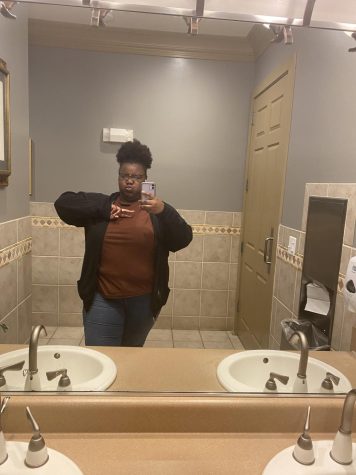Celebrating Black Herstory
February 23, 2023
You might think of Michelle Obama, Serena Williams, or Beyoncé when you think of famous Black women to look up to. However, these modern role models are far from the first powerful Black women in history to effect lasting change in the United States.
The groundbreaking firsts go back centuries, far beyond Katherine Johnson and Rosa Parks. Katherine Johnson, in case you didn’t know, was one of NASA’s mathematicians who helped send Americans into space for the first time. During Black History Month and throughout the year, it’s important to remember these women and how they helped shape society into what it is today. Here are some Black women who’ve transformed U.S history.
Sandra Wicks (1949- Present)
In 1949, Sandra Wicks Lewis was born in Charlottesville, at the University of Virginia hospital. Her father served as a pharmacy assistant, while her mother owned a beauty parlor. Lewis has fond memories of her childhood in the city. She went to Jefferson Elementary School, an all-Black institution, for first and second grade. She was one of the child plaintiffs in a federal case the NAACP had brought against the Charlottesville School Board because it had turned down the admission of two Black kids to Lane High School and ten Black students to Venable Elementary School. The “Charlottesville Twelve” were later given that name. Lewis went on to become one of the first African American women to graduate from UVa’s College of Arts & Sciences. She later earned her MBA and had a career in finance. As a way of giving back, Lewis has established scholarship funds for Charlottesville high schoolers and UVA students.
Misty Copeland (1982- Present)
Misty Copeland is an American ballet dancer and the first African American woman to be promoted to principal dancer in American Ballet Theatre (ABT). She began her ballet training at the late age of 13, and joined ABT’s Studio Company in 2000 and its corps de ballet in 2001. She was promoted to soloist in 2007, and to principal dancer in 2015. Copeland has also been recognized for her work as an author, speaker, and advocate for diversity in the dance world. She has written several books, including a memoir, “Life in Motion: An Unlikely Ballerina,” and children’s books, “Firebird,” “Bunheads” and “Ballerina Body.” In addition, Copeland has been a brand ambassador for several companies such as Under Armour, Estée Lauder and Seiko.
Vernice Armour (1973- Present)
Vernice Armour is an American retired United States Marine Corps officer, pilot and attorney. She is the first African-American female combat pilot in the Marine Corps, and the first African-American female pilot in the U.S. military. Armour was commissioned as a second lieutenant in the Marines in 2000 and served as a helicopter pilot in the Iraq War. She later became a military prosecutor, and then a defense attorney. After leaving the military, Armour became an advocate for veterans and women in leadership, and has spoken at conferences and events on those topics. She is also the author of the book “Zero to Breakthrough: The 7-Step, Battle-Tested Method for Accomplishing Goals that Matter.”
Wangari Maathai (1940-2011)
Wangari Maathai was a Kenyan environmental and political activist. She was the founder of the Green Belt Movement, an organization focused on planting trees and promoting sustainable development in Kenya. In 2004, she became the first African woman to receive the Nobel Peace Prize for her “contribution to sustainable development, democracy, and peace.” Maathai was born in Kenya in 1940 and studied in the United States, earning a Ph.D. in Biological Sciences from the University of Pittsburgh in 1971. She returned to Kenya and began working as a lecturer at the University of Nairobi. In 1977, she founded the Green Belt Movement, which aimed to combat deforestation and desertification in Kenya by encouraging local communities to plant trees. The movement also worked to empower women and improve their economic status by providing them with training and resources to plant and care for the trees. Maathai’s work with the Green Belt Movement and her advocacy for sustainable development, democracy, and human rights earned her numerous awards and honors, including the Nobel Peace Prize. She passed away in 2011.
Daisy Bates (1914-1999)
Daisy Bates was an American civil rights activist and leader. She is best known for her work as the president of the Arkansas chapter of the National Association for the Advancement of Colored People (NAACP) and her role in the Little Rock Nine desegregation crisis of 1957. Bates was born in Huttig, Arkansas in 1914 and grew up in poverty. She became an advocate for civil rights at an early age, and in 1951, she was elected president of the Arkansas NAACP. In this role, she worked to end segregation and discrimination against African Americans in the state, particularly in the area of education. In 1957, Bates played a key role in the Little Rock Nine crisis, a pivotal moment in the American civil rights movement. The crisis involved nine African American students who were chosen to integrate Little Rock Central High School in Arkansas. Bates provided guidance and support to the students, who faced intense opposition and violence from white segregationists. Her efforts and dedication helped the students to succeed in their studies despite the hostile environment. Daisy Bates passed away in 1999, but her legacy lives on as a civil rights icon.
Claudette Colvin (1939-Present)
Claudette Colvin is a civil rights activist from Montgomery, Alabama. In 1955, at the age of 15, she refused to give up her seat on a bus to a white person, nine months before Rosa Parks’ more famous protest. Colvin’s action led to her arrest, and she became one of the four plaintiffs in the Montgomery bus boycott case, Browder v. Gayle, which challenged the constitutionality of Alabama and Montgomery segregation laws on buses. The boycott lasted for 385 days and ultimately led to the U.S. Supreme Court declaring the laws unconstitutional. Colvin’s case was considered a catalyst for the Civil Rights Movement.
Mahalia Jackson (1911-1972)
Mahalia Jackson was an American gospel singer, widely considered one of the most influential gospel singers in the world. Born in New Orleans in 1911, she began singing in church at a young age and went on to become a popular performer in the 1940s and 1950s. She was known for her powerful and emotive voice, and her performances were often compared to those of a gospel preacher. She was also politically active and was a close friend of Martin Luther King Jr., singing at many of the Civil Rights Movement’s events, including the March on Washington for Jobs and Freedom in 1963. She died in 1972 and has been honored by many organizations for her contributions to gospel music and civil rights.
Florence Joyner (1959-1998)
Florence Joyner, also known as “Flo-Jo”, was an American track and field athlete and a member of the International Association of Athletics Federations Hall of Fame. She competed in the 1984 and 1988 Olympics, winning four gold medals and setting world records in the 100m, 200m and 4x100m relay events. She was known for her flashy and colorful uniforms and her long, painted nails, which led to her being called “the fastest woman alive” and “the queen of track.” She helped to break barriers for Black women in the sport of track and field, as she was one of the first African American female athletes to achieve mainstream success and international recognition in the sport. She was also an advocate for women’s rights and worked to promote physical fitness among children. Her Olympic performances and her ability to transcend sport as a cultural icon helped to inspire many young black women to pursue their dreams in sports and in other areas of life. Even today, her legacy and impact on the sport and on society is still remembered.
Marsha P. Johnson (1945-1992)
Marsha P. Johnson was an American gay liberation activist and self-identified drag queen. She was a prominent figure in the Stonewall riots of 1969 and co-founded the Street Transvestite Action Revolutionaries (STAR) along with Sylvia Rivera. She also was an AIDS activist and worked with ACT UP to fight for the rights of people with AIDS. She had a significant impact on the LGBTQ rights movement, particularly for trans women and people of color. Johnson’s activism continued until her death in 1992, where her death was ruled as suicide, but many of her friends and advocates believe it was a murder. In recent years, there have been renewed calls to investigate her death as a possible hate crime.
Audre Lorde (1934-1992)
Audre Lorde was an American author, poet, and civil rights activist. Born in New York City in 1934, she was a leading voice in the feminist and civil rights movements of the 1960s and 1970s. She was a self-described “black, lesbian, mother, warrior, poet” and wrote extensively about the intersections of race, gender, sexuality, and class. She was a highly influential figure in the feminist and LGBTQ+ movements, and her work continues to be studied and celebrated today. Lorde’s most famous works include “Zami: A New Spelling of My Name” and “Sister Outsider.” Lorde died in 1992 from breast cancer, but her work has been an important legacy for Black feminists, queer, and womanists to reflect upon.
Sister Rosetta Tharpe (1915-1973)
Sister Rosetta Tharpe was an American singer, songwriter and guitarist. She was one of the most popular gospel singers of the 1930s and 1940s, and is considered a pioneer of rock and roll music. She was known for her powerful performances, as well as her virtuosic guitar playing, which blended elements of gospel, blues, and jazz. She was a trailblazer for black female artists and one of the first to successfully cross over to mainstream audiences. She also recorded duets with Marie Knight and released several albums. Tharpe’s influence can be heard in the music of many later artists, including Little Richard, Elvis Presley, and Jerry Lee Lewis. She died in 1973 but her legacy continued to be celebrated by musicians and music lovers all over the world.
Flo Kennedy (1916-2000)
Florynce “Flo” Kennedy was an American feminist, civil rights activist, and attorney. She was a leader in the feminist movement in the 1960s and 1970s and played a significant role in fighting for the rights of women, people of color, and the LGBTQ+ community. Kennedy was a highly visible and vocal advocate for reproductive rights and was known for her bold and confrontational tactics. She co-founded the National Black Feminist Organization in 1973 and the Feminist Party in 1971. She was also a lawyer and became the first black woman to have her own law firm in New York City. Kennedy was also an author and a frequent speaker, she continued her activism until her death in 2000.
Angela Davis (1944-Present)
Angela Davis is an American political activist, philosopher, and author. She is a prominent figure in the Civil Rights Movement, and has been a vocal critic of racism, poverty, and inequality. She has also been a leading voice in the feminist and LGBTQ+ rights movements. Davis’s activism began in the 1960s and she was a member of the Communist Party USA and the Black Panther Party. She was also a leader in the movement to free political prisoners, including the “Soledad Brothers”. Her activism led her to be placed on the FBI’s most wanted list and she spent time in prison. Davis’s activism and scholarship focus on intersectionality, and she is known for her work on the social, political and economic issues of black women. Her most famous book is “Women, Race, & Class” (1981) which has been widely read and taught in universities. Her work continues to be influential in critical race theory, feminist theory, and the movement for prison abolition. Davis continues to be an active public speaker and organizer, her ideas and activism have been significant in shaping the way we understand and fight against systemic racism, oppression, and discrimination.







